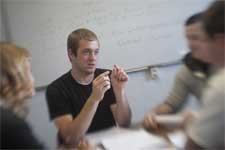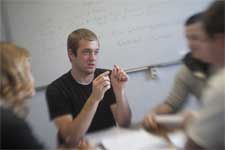 More students helping more students
More students helping more students
KINGSTON, R.I. – August 12, 2010 – Seven years ago David Hayes, director of the University of Rhode Island’s Academic Enhancement Center, envisioned a learning center run by students for students. “We wanted to create a diverse, inclusive learning assistance center in which all students could feel welcomed, supported, and valued,” he explained.
That vision has become a reality. In 2005, student contact hours were just under 5,900 hours. Last year, the center recorded more than 19,000 contact hours. Not only has the number of students visiting the center increased, but in many cases so have their grade point averages.
“Attendance in our popular Supplemental Instruction sessions has quadrupled. Students who participate routinely in supplemental instruction typically earn course-based grade point averages ranging a half to a full point higher than their non-participating classmates,” the director said.
The Supplemental Instruction program leaders are different than subject tutors, as they are directly connected with the classes, the lecture, and the course instructor. “They plan and facilitate weekly interactive sessions around course content to help students build the necessary skills to be successful in class,” said Kathryn Crisostomo, the center’s assistant director.
About 50-55 students work each year at the center for credit or pay. Between 15-20 become supplemental instruction leaders while 25-30 more become subject tutors. The remaining students are receptionists, akin to air traffic controllers, directing students to the best location to land.
The center offers course-specific tutoring programs for students in a broad range of math, sciences, and humanities courses.
The majority of students who use tutoring services come for help in math and math-intensive business and science courses. “These high risk courses have many review and tutoring sessions available every day,” said Hayes.
“Tutors provide long-term support and guidance to help their peers become stronger life-long learners,” said 2007 alumna Hillary Ornberg, a former graduate assistant at the center who graduated with a master’s degree in rhetoric and composition. “While professors and teaching assistants offer as much help as they can, their busy schedules do not always allow for customized support.
“I watched students become more confident, set attainable goals, and learn the skills and strategies they needed to achieve those goals,” she said. “Working at the center helped prepare me for graduate study at the Harvard Graduate School of Education as well as my current occupation as an assistant director of peer services at Suffolk University’s learning center.”
Assistant Director Crisostomo attributes part of the center’s success to a strong relationship with college departments and faculty members. The assistant director also praised the student leaders and tutors. “Their confidence in the subject matter combined with their approachability, really helps students feel comfortable and makes them want to come back each week.”
“As a future teacher, I wanted this college level tutoring experience to further understand students as learners,” said Erica Sevey, a math and physics tutor. “I have seen students become more confident with material in classes that was initially challenging or overwhelming for them.”
Sevey agrees with the center’s motto: teaching is learning. “I have deepened my own understanding of all the concepts that I tutor. For example, when teaching a student about trigonometric functions, I need to have a thorough understanding of them in order to gauge the depth of the student’s understanding.”
The center offers students learning support to alleviate anxiety, perform better on exams, and become more effective with self-assessment, decision-making, and time management.
“Every change that we’ve made in the past seven years was a direct result of student and faculty feedback,” Hayes said. “Tutoring shifted from being appointment-based to walk-ins. We introduced tutoring services in the residence halls, and we’ve changed the number and type of workshops we hold.”
Pictured above
URI student Evan Denard from Doylestown, Pa. tutors in URI’s Academic Enhancement Center. URI photo taken by Joe Giblin.

